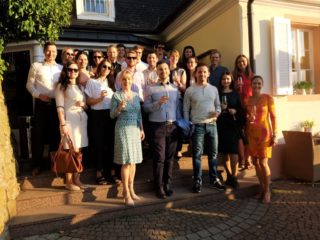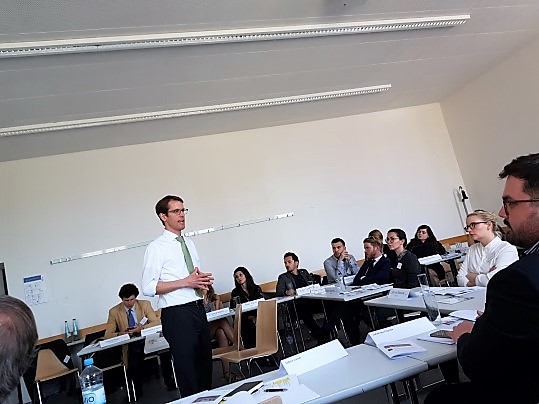Europa United contributor Luca Contrino took time off to attend a insightful seminar on the future of Europe which was hosted by our good friends in United Europe in Germany just a few weeks ago. In conjunction with the Europe Day celebrations, we bring his report on the seminar and we find out what are the main topics on the kind of the youth of Europe.
From the 20th to the 21st of April I had the honour of attending the United Europe “Understanding Europe” event as a representative of Europa United, held at Albert Ludwigs University in the pleasant city of Freiburg in Southern Germany. The event consisted of debates and seminars over two days with expert speakers on each given subject and gave participants the chance to engage with the speakers and each other.
On the first day, the German MEP Andreas Schwab, who himself is from the Baden-Württemberg region, gave an outline of his work and the workings of the European parliament as well as his views on the importance of a peaceful and integrated Europe to a region like Baden-Württemberg. Here, companies, individuals and institutions cooperate extensively with those in the neighbouring Alsace region of France as well as Basel and its surrounding areas in Switzerland. It is testimony like Mr. Schwab’s that is essential for highlighting just what the Union now provides us with, not just in the ease of undertaking economic activities, but in the effortless crossing of borders and interpersonal relations across borders that were unthinkable in a relatively recent past. In order to better understand Mr. Schwab’s work within the EU institutions, the next speaker Urs Pötzsch helped clarify the responsibilities of the main EU institutions (The Parliament, Council and Commission). I personally have studied these institutions, but of course, they are confusing at times and they are fundamental to understanding why and how the Union operates as it does, and the frustrations that this sometimes entails. The first evening ended with a tour through Freiburg’s charming old town and a chance to try some of the wines that characterise this sunny corner of Germany and get to know the other participants.
The second day moved away from discussions on structural elements to the main challenges facing the Union at present. First up, Dr. Matthias Kullas picked our brains on the question of the Euro crisis. Despite receding from the news, it continues to be an issue over fears over certain states’ public debts. The discussion also touched on the root causes of their problems with the Euro, with myself giving a take on the Italian issue and a Greek participant commenting on Greece’s ongoing issues with the single currency. Following this, Dr. Götz Reichert moved onto the pressing issue of energy transition, and the difficulties in bringing about change at a European level. Finally, the subject of Brexit had to be discussed, with Dr. Bert Van Roosebeke leading the session. This last one was particularly prickly, as we had British participants who were able to share their takes on the issue and their frustrations, as committed Europeans, at the Leave vote’s victory. As someone with personal connections to the United Kingdom, it is an issue of great relevance to me too, so I appreciated the possibility of discussing this theme that will go on to define not only the Union, but interpersonal relations for many of its citizens.
The event was not only a chance for young people from the EU states to discuss their desired direction for the Union, but also for citizens of non-EU states to share their perceptions of the European project. It was heartening to hear that despite its challenges, the EU’s existence is widely acknowledged as a force for good, but that it can offer a role model for other regions of the world, as well as an end goal for current candidate states. No one has all the answers in relation to the challenges facing the Union, but it is reassuring to know that young people from Europe (and beyond) believe in the validity of the European project and are invested in its continuation and its ability to improve life for its current and future members. Armed with this new knowledge and these new perspectives, the challenge now is to make sure that the conclusions from our debates and discussions can reach other European citizens and the institutions that make this Union. Arguably, the future of Europe was not only discussed at these seminars, it was also present in the shape of the individuals that shared their ideas and hopes for the future. Let’s make sure this positive experience provides the foundations for increased action and advocacy.

The text was first published on May 6 by our cooperation partner Europa United, a non-profit Irish/German organisation focusing on European issues and current affairs.



